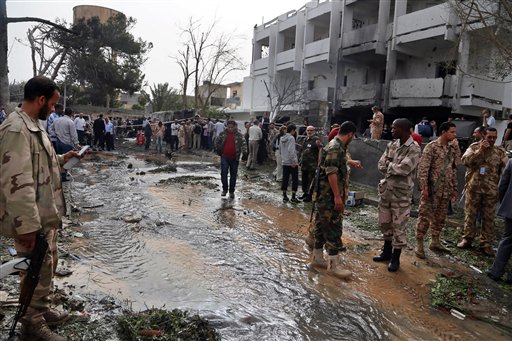(AP) Car bomb targets French embassy in Libya
By ESAM MOHAMED
Associated Press
TRIPOLI, Libya
A car bomb targeted the French embassy in the Libyan capital early on Tuesday, wounding two French guards in an attack that President Francois Hollande denounced as an assault not only against France but all countries engaged in the fight against terrorism.
The explosives-laden car was detonated just outside the embassy building in Tripoli’s upscale al-Andalus neighborhood very early in the morning, before any of the embassy staff had arrived inside the diplomatic mission, two Libyan security officials said.
The blast wounded two French guards and set off a fire at the embassy entrance that engulfed some of the offices inside, the officials said. Two cars parked outside also caught fire and two other nearby buildings were also damaged, said the officials, speaking on condition of anonymity because they were not authorized to talk to the media. Firefighters rushed to the scene of the attack.
The officials said the motives for the attack _ the first such assault on an embassy in the Libyan capital _ were not immediately clear.
In Paris, President Hollande denounced the attack, saying in a statement that it targeted not only France but “all countries in the international community engaged in fighting terrorism.”
He also said that a foreign ministry representative will be sent to Tripoli to take “necessary measures” and to bring home the two wounded French guards.
Two years after the country’s civil war, Libya is struggling to maintain security, build a unified army and reign in militias, which include rebels who fought to oust the country’s longtime dictator Moammar Gadhafi in 2011.
France, along with Britain, took a leading role in the NATO-led air campaign against Gadhafi’s forces.
Hollande’s predecessor, President Nicolas Sarkozy, was hailed by many in Libya for France’s role, and Paris has sought to maintain close economic and political contacts with the new leadership in Tripoli.
However, the war left Libya awash with weapons, adding to the country’s security challenges. An expert panel wrote to the U.N. Security Council this month warning that “Libya has over the past two years become a significant and attractive source of weaponry in the region.”
It said civilians and militias remain in control of most weapons in Libya, adding that “the lack of an effective security system remains one of the primary obstacles to securing military materiel and controlling the borders.”
On Sept. 11, four Americans _ including the U.S. Ambassador in Libya Chris Stevens _ were killed when militants attacked the U.S. diplomatic mission on the eastern Libyan city of Benghazi.
Also, in the post-Gadhafi turmoil in Libya, several diplomats, relief agencies and churches have come under attack and scores of Libyan security officials have been assassinated. In most cases, the government fails to nail down culprits or make arrests, either because of fear of counterattacks or the lack of capabilities to carry out a proper investigation.
French officials have expressed concerns about the possibility of greater instability in Libya, where they believe at least some rebel fighters from Mali fled following France’s military onslaught to dislodge al-Qaida-linked militants.
Last week, Al-Qaida’s North Africa branch, Al-Qaida in the Islamic Maghreb, or AQIM, threatened to seek revenge against all countries taking part in the French-led war in Mali, warning that no one who has participated will be safe.
French Foreign Minister Laurent Fabius also condemned the Tripoli bombing, calling it an “abhorrent act.” His statement said the foreign ministry was “in liaison with the Libyan authorities” and that France will “do everything it can to shed light on the circumstances of this abhorrent act and to quickly identify the perpetrators.”
The French foreign ministry later said that at Hollande’s request, Fabius was to travel to Tripoli later Tuesday to assess the situation.
The two Libyan security officials said that one of the wounded guards sustained severe injuries while the other was lightly hurt, adding that an investigation into the attack was underway.
The attack site was later cordoned off, with heavy national guard and army units with armored vehicles surrounding the area. Libyan Deputy Prime Minister Awad al-Barassi and Foreign Minister Mohamed Abdelaziz visited the site of the explosion. The Cabinet in Tripoli said it would issue a statement later.
___
Associated Press writers Maamoun Youssef in Cairo and Thomas Adamson in Paris contributed to this report.

COMMENTS
Please let us know if you're having issues with commenting.